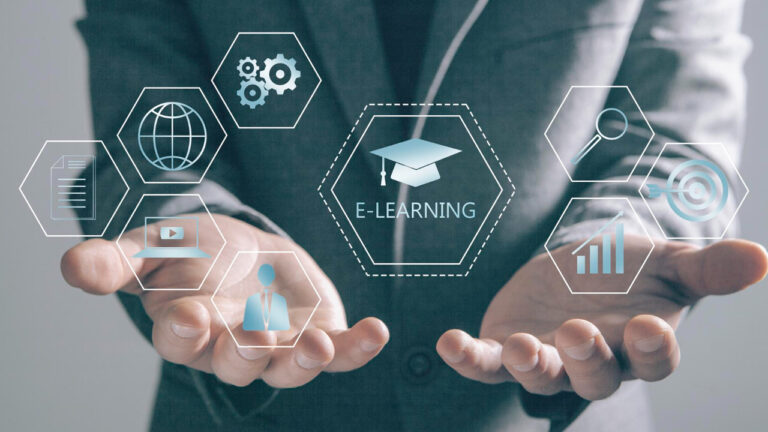In today’s fast-paced business world, staying ahead means investing in continuous learning and development. That’s where a robust Learning Management System (LMS) comes into play. But with so many options out there, finding the best corporate LMS can feel overwhelming.
What Is a Corporate LMS?
A corporate Learning Management System (LMS) is software designed to deliver, track, and manage training programs within an organization. It streamlines the process of employee development by providing a centralized platform for learning materials, assessments, and performance tracking.
Key Features
- Course Management with Skill and Role-Based Learning Path: Organizes and delivers courses efficiently. Users can access course catalogs, enroll in courses, and complete assignments depending upon their competency and required skill set in sync with business goals.
- Analytics and Reporting: Tracks learner progress with detailed reports on completion rates, assessment scores, and engagement levels.
- Configuration: Ability to adapt to company-specific needs and business objectives for better fitment. Options for custom workflows (beyond just branding configuration) enhance user experience.
- Mobile Accessibility: Supports learning on-the-go via mobile devices. Ensures that employees can access training anytime.
- Integration Capabilities: Connects with other enterprise systems like HR software, CRM platforms or any data-driven platforms to compare and publish the performance dashboard for facilitating seamless data flow across departments.
- Improved Training Efficiency: Streamlines administrative tasks associated with traditional training methods.
- Enhanced Employee Engagement: Interactive features like quizzes and discussion forums keep learners engaged.
- Cost Savings: Reduces expenses related to travel, venue booking, and printed materials.
- Consistency in Training Delivery: Ensures uniformity in content delivery across different locations.
Corporate LMS solutions play a crucial role in fostering continuous learning within organizations by making training more accessible, efficient and engaging for all employees.
Key Features of Corporate LMS
A corporate LMS offers various features that streamline training and development. Below, I detail the key functionalities that make these systems invaluable for organizations.
1. Central Management of Learning Content
Corporate LMS platforms centralize learning content, making it easier to manage and update materials. Administrators can upload courses, documents, videos, and other resources in one location. This ensures content consistency across the organization. For example, when compliance regulations change, updates can be made quickly to all relevant materials.
2. Tracking and Reporting
Tracking employee progress is crucial for measuring training effectiveness. A corporate LMS provides detailed analytics on course completion rates, quiz scores, and engagement levels. Managers can generate reports to identify areas where employees may need additional support or further training.
3. Personalization and Adaptive Learning
Personalized learning paths enhance engagement by tailoring content to individual needs. With adaptive learning features, a corporate LMS adjusts the difficulty level based on user performance. Employees receive customized recommendations for courses or modules they should complete next.
4. Integration and Scalability
Integration capabilities ensure seamless operation with existing HR systems like payroll and performance management tools. Scalability allows organizations to expand their training programs as they grow without needing new software solutions. For instance, adding more users or new departments becomes straightforward with scalable infrastructure.
5. Auto Content Authoring
Auto content authoring in an LMS uses AI and automation to quickly create learning content, such as courses, quizzes, and assessments. It streamlines course development by generating content from raw data, offering pre-built templates, and integrating media with minimal manual effort. Features like adaptive learning, translation, and automated transcription enhance personalization and accessibility.
These key features demonstrate how a robust corporate LMS supports efficient and effective employee development efforts within any organization.
Benefits of Using a Corporate LMS

Corporate Learning Management Systems (LMS) offer many advantages for organizations aiming to streamline their training programs. Here are the key benefits that make an LMS indispensable in a corporate setting.
1. Increased Training Efficiency
A corporate LMS centralizes learning materials, making it easy to deliver and update courses. Employees access consistent content anytime, reducing time spent on redundant tasks. Automated administrative functionalities like enrollment, assessments, and notifications further reduce manual workload. This efficiency ensures employees spend more time learning and less on logistics.
2. Enhanced Performance Tracking
An LMS provides robust analytics tools that track employee progress through various metrics such as course completion rates, assessment scores, and engagement levels. These insights help identify knowledge gaps and measure the effectiveness of training programs. Managers can make data-driven decisions to improve training strategies based on real-time performance data.
3. Cost Savings
Using an LMS reduces costs associated with traditional training methods like printed materials, travel expenses for trainers, or venue rentals. Digital courses eliminate these expenditures while providing scalable solutions accessible from anywhere. Additionally, automated processes cut down administrative overheads, contributing to overall cost-efficiency.
4. Scalability and Flexibility
An LMS adapts easily whether you’re onboarding new hires or rolling out company-wide compliance training. It scales seamlessly without requiring additional resources or significant changes in infrastructure. The flexibility allows customization of learning paths tailored to specific roles or departments within the organization.
5. Improved Employee Retention
Continuous learning opportunities provided by an LMS contribute significantly to employee satisfaction and retention. Access to upskilling resources makes employees feel valued and invested in their careers within the company. A well-implemented corporate LMS fosters a culture of growth which is crucial for retaining top talent.
These benefits collectively illustrate how adopting a corporate LMS enhances overall organizational performance by improving efficiency, tracking outcomes effectively, saving costs, offering flexible solutions at scale, and boosting employee morale through continuous development opportunities.
Types of Corporate LMS Deployments
Corporate LMS deployments vary based on organizational needs. Each type offers unique benefits and challenges.
Cloud-Based LMS
Cloud-based LMS platforms store data on remote servers, accessible via the internet. These solutions offer scalability, reduced IT overhead, and frequent updates. Users can access training materials anytime from anywhere, enhancing flexibility.
Self-Hosted LMS
Self-hosted LMS installations reside on an organization’s own servers. This option gives complete control over data security and customization but requires significant IT resources for maintenance.
Mobile Application
Mobile applications for corporate LMS enable learning on the go. Employees can complete courses or access materials through smartphones or tablets, increasing engagement and accessibility.
Choosing the Best Corporate LMS for Your Organization
Selecting the right corporate LMS is crucial for optimizing employee development and training. A systematic approach ensures that the chosen system aligns with organizational goals.
Defining Requirements
First, outline specific needs to guide your search. Identify training objectives, target audience size, and industry-specific compliance requirements. Consider whether you need features like gamification, social learning, or certification management. Clear requirements streamline the selection process.
Evaluating Features
Next, assess key functionalities offered by various platforms. Look for robust course management tools, detailed analytics reports, and customizable user interfaces. Ensure mobile accessibility to support remote learners and check integration capabilities with existing systems like HR software or CRM platforms. Most important is if it can be configured to business needs and got the capability to enhance it further as you use along in future
Considering User Experience
User experience directly impacts engagement levels. Choose an intuitive platform with easy navigation and responsive design. Test user interface through demos or free trials to ensure it meets both admin and learner needs effectively.
Analyzing Pricing Models
Finally, examine pricing structures of potential LMS options. Compare subscription-based models versus one-time license fees based on budget constraints. Factor in additional costs such as implementation services or technical support when calculating total investment.
Careful consideration across these areas aids in selecting a corporate LMS that enhances training efficiency while aligning with organizational requirements.
Top Corporate LMS Trends and Innovations

Staying updated with the latest trends and innovations in corporate LMS is crucial for maximizing its benefits. Here are some key trends shaping the future of corporate learning platforms.
Gamification and Engagement
Gamification transforms traditional training methods by incorporating game-like elements, making learning more interactive and engaging. Features like leaderboards, badges, and points systems motivate employees to complete courses. For instance, implementing a points system where employees earn rewards for completing modules can boost participation rates significantly.
AI and Personalization
Artificial Intelligence (AI) enhances personalization within corporate LMS platforms by tailoring content to individual learning preferences. Algorithms analyze user data to recommend personalized learning paths, ensuring that employees receive relevant training materials. An example includes adaptive assessments that adjust difficulty levels based on performance, providing a customized learning experience.
Remote and Hybrid Learning
Remote and hybrid work models have increased the need for flexible learning solutions. A robust corporate LMS supports these models by offering mobile accessibility and cloud-based resources. Employees can access training materials anytime, anywhere using smartphones or tablets. This flexibility is essential for maintaining continuous development in remote or hybrid working environments.
By integrating these trends into a corporate LMS strategy, organizations can foster an engaging, personalized, and flexible learning environment that aligns with modern work practices.
Potential Challenges and Solutions
Selecting the best corporate LMS comes with its own set of challenges. Understanding these potential hurdles and their solutions can help streamline the adoption process.
Implementation Costs
High initial expenses often deter organizations from investing in a corporate LMS. While upfront costs may be significant, they are an investment in long-term efficiency and savings. Opt for scalable pricing models that fit the organization’s budget constraints. Many providers offer tiered pricing plans based on user count or features, allowing gradual scaling as the organization grows.
User Adoption
Employee resistance to new systems can hinder successful LMS implementation. Ensure thorough onboarding and training sessions to familiarize employees with the platform’s functionalities. Use intuitive interfaces and user-friendly designs to enhance accessibility. Encouraging feedback through surveys or focus groups helps identify pain points, enabling timely adjustments to improve user experience.
Customization and Integration
Customization capabilities ensure that an LMS aligns with specific organizational needs but may increase complexity. Choose systems that offer robust integration options with existing tools like HR software, CRM platforms, or communication apps (e.g., Slack). Evaluate APIs and third-party plugins before committing to a provider to guarantee seamless data flow across various applications.
These strategies address common challenges associated with implementing a corporate LMS, ensuring smooth deployment while maximizing benefits for employee development initiatives.
Final Thought
Choosing the right corporate LMS is crucial for fostering a culture of continuous learning and development within any organization. The right platform can streamline training, enhance employee engagement, and provide significant cost savings. By focusing on key features like course management, analytics, customization, and mobile accessibility, you can find a solution that aligns with your organizational goals.
Stay updated with current trends such as gamification and AI-driven personalization to keep your training programs engaging and effective. Address potential challenges proactively by selecting scalable pricing models and ensuring thorough onboarding. With careful consideration, a robust corporate LMS will elevate your organization’s performance and efficiency in today’s fast-paced business environment.


